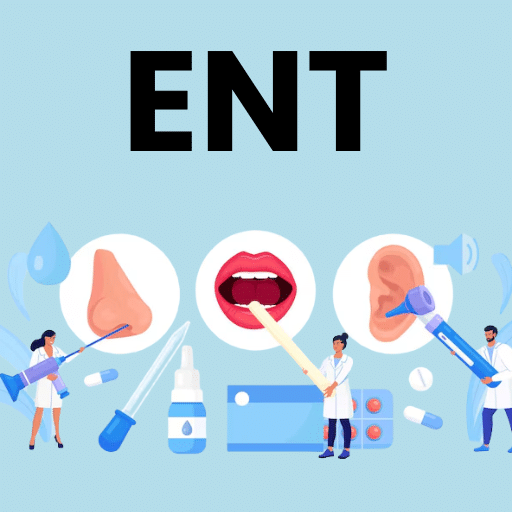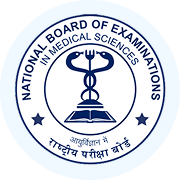
|
INFINITY COURSE
Ear Nose Throat (ENT) for NEET PG309 students learning this week · Last updated on Oct 22, 2025 |
Ear Nose Throat (ENT) Study Material
Trending Courses for NEET PG
Ear Nose Throat (ENT) for NEET PG Exam Pattern 2025-2026
Ear Nose Throat (ENT) Exam Pattern for NEET PG
The NEET PG (National Eligibility cum Entrance Test for Postgraduate) is a crucial examination for aspiring medical professionals in India. Understanding the exam pattern for the ENT section can greatly enhance preparation strategies. Below is a detailed breakdown of the ENT exam pattern for NEET PG.
1. Exam Structure
- Duration: The NEET PG exam lasts for a total of 3 hours and 30 minutes.
- Total Questions: The exam comprises 200 multiple-choice questions (MCQs).
- Subjects Covered: Questions are distributed across various subjects, including ENT, General Medicine, Surgery, and others.
2. Question Distribution
- Number of ENT Questions: Typically, around 10-15 questions are focused specifically on ENT.
- Types of Questions: Questions may include clinical scenarios, diagnostic procedures, and treatment protocols related to ENT.
3. Marking Scheme
- Correct Answer: Each correct answer earns 4 marks.
- Incorrect Answer: 1 mark is deducted for each wrong answer.
- No Response: Questions left unanswered do not affect the overall score.
4. Preparation Tips
- Study Material: Utilize standard textbooks and reference materials for ENT.
- Practice MCQs: Regularly practice MCQs to familiarize yourself with the question format.
- Mock Tests: Take full-length mock tests to improve time management and test-taking strategies.
5. Important Topics to Cover
- Common ENT Disorders: Understand the diagnosis and management of common conditions such as otitis media, sinusitis, and hearing loss.
- Surgical Procedures: Familiarize yourself with surgical techniques and indications for ENT surgeries.
- Pharmacology: Review medications commonly used in ENT practices.
By understanding the exam pattern and focusing on key areas, candidates can enhance their preparation for the ENT section of the NEET PG exam, ultimately leading to better performance and outcomes.
Ear Nose Throat (ENT) Syllabus 2025-2026 PDF Download
NEET PG Ear Nose Throat (ENT) Syllabus
The NEET PG ENT syllabus is crucial for candidates aspiring to excel in the postgraduate entrance examination. This syllabus covers various aspects of ear, nose, throat, and related anatomical structures, ensuring a comprehensive understanding of otorhinolaryngology.
NEET PG Ear
The section on NEET PG Ear encompasses the following key topics:
- Anatomy of the Ear
- External Ear
- Middle Ear
- Inner Ear
- Physiology of Hearing
- Common Ear Disorders
- Otitis Media
- Tinnitus
- Hearing Loss
- Diagnostic Procedures
- Audiometry
- Tympanometry
- Management of Ear Conditions
NEET PG Nose
The NEET PG Nose section includes the following vital topics:
- Anatomy of the Nose
- Nasal Cavity
- Paranasal Sinuses
- Physiology of the Nose
- Common Nose Disorders
- Rhinitis
- Sinusitis
- Nasal Polyps
- Diagnostic Techniques
- Nasal Endoscopy
- Imaging Studies
- Management of Nasal Conditions
NEET PG Oral Cavity and Pharynx
This section covers the following essential topics:
- Anatomy of the Oral Cavity
- Teeth
- Tongue
- Gums
- Pharyngeal Anatomy
- Common Disorders of the Oral Cavity and Pharynx
- Oral Candidiasis
- Pharyngitis
- Tonsillitis
- Diagnostic Procedures
- Oral Examination
- Throat Culture
- Management of Oral and Pharyngeal Conditions
NEET PG Larynx
The Larynx section focuses on the following topics:
- Anatomy of the Larynx
- Physiology of Voice Production
- Common Laryngeal Disorders
- Laryngitis
- Vocal Cord Nodules
- Stridor
- Diagnostic Approaches
- Laryngoscopy
- Voice Assessment
- Management of Laryngeal Conditions
NEET PG Important Instruments in ENT
Understanding the important instruments used in ENT is crucial for practical applications. Key instruments include:
- Otoscope
- Nasoscope
- Endoscopes
- Flexible Endoscope
- Rigid Endoscope
- Microscope
- Suction Apparatus
- Forceps and Scissors
In conclusion, the NEET PG syllabus for Ear, Nose, and Throat (ENT) covers a comprehensive range of topics essential for understanding the complexities of otorhinolaryngology. Mastery of this syllabus is vital for success in the NEET PG examination.
This course is helpful for the following exams: NEET PG
How to Prepare Ear Nose Throat (ENT) for NEET PG?
How to Prepare Ear Nose Throat (ENT) for NEET PG
Preparing for the Ear Nose Throat (ENT) section of the NEET PG exam can be a daunting task, but with the right strategies and resources, you can excel in this crucial subject. Here are key points to guide your preparation effectively.
1. Understand the Syllabus
Familiarize yourself with the NEET PG syllabus for Ear Nose Throat (ENT). Key areas of focus include:
- Anatomy of the ear, nose, and throat
- Common diseases and disorders
- Diagnostic and therapeutic procedures
- Recent advancements in ENT
2. Use Quality Study Material
Utilize comprehensive resources such as textbooks and review articles. EduRev offers specialized courses for the Ear Nose Throat (ENT) category that can help strengthen your understanding.
3. Create a Study Schedule
Establish a realistic timetable that allocates time for each topic within Ear Nose Throat (ENT). Make sure to include:
- Regular revision sessions
- Practice tests
- Breaks to avoid burnout
4. Practice MCQs
Regularly practice multiple-choice questions (MCQs) related to Ear Nose Throat (ENT). This will help you familiarize yourself with the exam format. EduRev provides a variety of practice questions tailored for NEET PG.
5. Join Study Groups
Engage with peers through study groups. Discussing topics related to Ear Nose Throat (ENT) can enhance understanding and retention. Consider joining EduRev’s community forums to connect with fellow aspirants.
6. Focus on Clinical Cases
Study clinical cases and scenarios related to Ear Nose Throat (ENT). This will help you apply theoretical knowledge to practical situations, which is crucial for the NEET PG exam.
7. Regular Revision
Make revision a part of your routine. Revisiting key concepts in Ear Nose Throat (ENT) will reinforce your memory and ensure that you retain information up to the exam day.
8. Mock Tests
Take full-length mock tests that cover Ear Nose Throat (ENT) topics. Assess your performance and identify areas of improvement. EduRev offers mock tests specifically designed for NEET PG preparation.
9. Stay Updated
Keep abreast of the latest developments in the field of Ear Nose Throat (ENT). Follow reputable medical journals and publications to stay informed about new research and treatment options.
10. Take Care of Your Health
Lastly, prioritize your health during your preparation for the NEET PG exam. Ensure you get enough rest, eat well, and engage in physical activity to keep your mind sharp and focused.
By following these strategies, you can effectively prepare for the Ear Nose Throat (ENT) section of the NEET PG exam. Remember that consistent effort and the right resources, like those offered by EduRev, will play a critical role in your success.
Importance of Ear Nose Throat (ENT) for NEET PG
Importance of Ear Nose Throat (ENT) Course for NEET PG
The Ear Nose Throat (ENT) specialty plays a crucial role in the holistic understanding of human health. Enrolling in an ENT course specifically designed for NEET PG aspirants offers numerous advantages that can significantly enhance a student's medical acumen.
1. Comprehensive Knowledge Base
ENT encompasses a wide range of conditions affecting the ears, nose, and throat. A dedicated course provides:
- In-depth understanding of anatomy and physiology
- Pathophysiology insights into common ENT disorders
- Familiarity with diagnostic techniques and treatment protocols
2. Enhancing Clinical Skills
Clinical skills are essential for effective patient management. The ENT course emphasizes:
- Hands-on training in examination techniques
- Practical exposure to various procedures
- Case studies for real-world application
3. Preparation for NEET PG
Success in the NEET PG exam requires a solid grasp of various subjects, including ENT. The course aids in:
- Streamlined study of ENT-related topics
- Focused revision strategies tailored for NEET PG
- Mock tests to evaluate readiness and boost confidence
4. Interdisciplinary Approach
Understanding ENT is vital for various medical fields. The course fosters:
- Collaboration with other specialties like neurology, oncology, and pediatrics
- Holistic patient care by integrating ENT knowledge
- Broader clinical perspective beneficial for future practice
5. Career Advancement Opportunities
Completing the ENT course can open doors to:
- Specialization options in otolaryngology
- Research opportunities in ENT-related fields
- Enhanced job prospects in healthcare settings
In summary, the Ear Nose Throat (ENT) course offered by EduRev is an invaluable asset for NEET PG aspirants. It not only equips students with the necessary knowledge and skills but also prepares them for a successful career in medicine.
Ear Nose Throat (ENT) for NEET PG FAQs
| 1. What are the common ENT conditions that candidates should study for NEET PG? |  |
| 2. How is the NEET PG exam structured in relation to ENT topics? |  |
| 3. What is the importance of understanding anatomical landmarks in ENT for NEET PG? |  |
| 4. What are the key diagnostic procedures in ENT that candidates should know? |  |
| 5. How can one prepare effectively for the ENT section of NEET PG? |  |
| 6. What role do imaging studies play in ENT diagnosis for NEET PG? |  |
| 7. What are the common surgical procedures in ENT that NEET PG candidates should be familiar with? |  |
| 8. Why is pharmacology important in ENT for NEET PG? |  |
| 9. What are the guidelines for managing hearing loss in patients? |  |
| 10. How do allergies affect ENT health, and what should candidates know? |  |
| 11. What is the significance of understanding pediatric ENT conditions for NEET PG? |  |
| 12. How does one differentiate between different types of sinusitis? |  |
| 13. What are the potential complications of untreated ENT infections? |  |
| 14. What lifestyle modifications can help manage chronic ENT disorders? |  |
| 15. How can one stay updated with the latest advancements in ENT for NEET PG? |  |
Best Coaching for Ear Nose Throat (ENT) for NEET PG
Tags related with Ear Nose Throat (ENT) for NEET PG

|
View your Course Analysis |

|

|
Create your own Test |

|





































